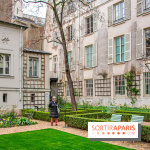In the heart of Paris' 6th arrondissement, the Musée national Eugène Delacroix, more commonly known as the Musée Delacroix, is a must-see for art lovers! Located at 6, rue de Furstenberg, this museum is dedicated to the famous painter Eugène Delacroix (1798-1863). This cultural space is more than just a museum: it was in fact Delacroix's apartment, where he lived for the last years of his life, from 1857 until his death in 1863. This historic residence was saved from destruction in 1929 by the Société des Amis d'Eugène Delacroix, and was finally transformed into a national museum in 1971, following a donation to the French state in 1954. Since 2004, the museum has been managed by the Louvre, reinforcing its prestige and importance in the Parisian cultural landscape.
The Musée Delacroix is more than just an exhibition space. It bears witness to the life and work of one of France's greatest painters. Delacroix's apartment, preserved in its original state, offers an intimate insight into his daily life and creative process. The preservation of this historic site reflects Delacroix 's importance in French art history and his contribution to 19th century art. The transformation of his final home into a museum reflects a commitment to preserving and celebrating the legacy of this iconic artist. The impetus for this fine cultural venue came from the determination of several famous painters of the 1920s, including Paul Signac, Edouard Vuillard, Ker-Xavier Roussel and Maurice Denis. They wanted to create a place that would pay tribute to Eugène Delacroix, whose work they admired. And so this unique museum was born.
The Musée Delacroix in Paris houses an impressive collection of works byEugène Delacroix, offering a unique insight into the career and artistic evolution of this iconic painter. Among the most remarkable works is Étude d'homme nu, known as Le Polonais (circa 1821-1822), which demonstrates Delacroix's mastery of the human body. Portrait d'Auguste Richard de La Hautière (1828) illustrates his ability to capture the personality of his subjects, while Bacchus et un tigre (1834) reveals his interest in mythological themes. Maquette pour Orphée apporte les arts et la paix aux Grecs encore sauvages (1843) and Esquisse pour Hercule attachant Nérée (1852) demonstrate his talent for large-scale dramatic compositions. Delacroix also explored reproduction techniques with Étude d'après un des Caprices de Goya (ca. 1825). The Portrait de George Sand (1834), L'Education de la Vierge (1842), La Madeleine dans le désert (1845), and Roméo et Juliette (scène des tombeaux des Capulets) (1851) are further outstanding examples of his diverse oeuvre and his ability to capture both reality and the imaginary.
And it's hard not to fall under his spell, if only because of the bucolic setting of his gardens. With a collection of nearly a thousand works, the museum immerses us in the heart of the artist's universe, discovering his paintings, drawings, prints and manuscripts, as well as objects that once belonged to him and the creations of artists he inspired. An opportunity to plunge into the world ofEugène Delacroix !



 Nuit des Musées 2025 in Paris: the program for the nocturne at the Musée Eugène Delacroix
Nuit des Musées 2025 in Paris: the program for the nocturne at the Musée Eugène Delacroix
Nuit des Musées returns to the Musée national Eugène Delacroix in Paris. This Saturday, May 17, 2025, we're off to discover a place that's well worth the detour. It's an opportunity to discover this charming museum-workshop by night. [Read more]
This page may contain AI-assisted elements, more information here.
Dates and Opening Time
Starts April 12, 2025
Sunday:
from 09:30 a.m. to 05:30 p.m.
Monday:
from 09:30 a.m. to 05:30 p.m.
Wednesday:
from 09:30 a.m. to 05:30 p.m.
Thursday:
from 09:30 a.m. to 05:30 p.m.
Friday:
from 09:30 a.m. to 05:30 p.m.
Saturday:
from 09:30 a.m. to 05:30 p.m.
Location
Musée national Eugène Delacroix
6 Rue de Furstenberg
75006 Paris 6
Access
Metro line 10 "Mabillon" station
Prices
Moins de 26 ans: Free
L'entrée: €7
Official website
www.musee-delacroix.fr
More information
The Musée Delacroix is closed for renovation from September 19, 2023 to March 19, 2024.



















